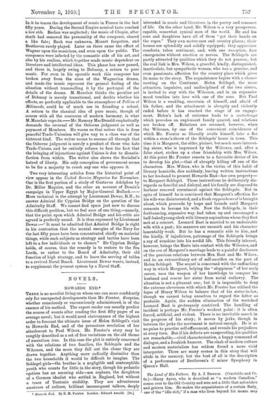NOVELS.
HO WARDS END.*
THERE is no novelist living on whom one can more confidently rely for unexpected developments than Mr. Forster. Surprise, whether consciously or unconsciously administered, is of the essence of his method. The expert reader can usually predict the course of events after reading the first fifty pages of an average novel; but it would need clairvoyance of the highest order to forecast the ultimate issue of Helen Schlegel's visit to Howards End, and of the premature revelation of her attachment to Paul Wilcox. Mr. Forster's story may be roughly described as a set of free variations on the old theme of amantium irae. In this case the plot is entirely concerned with the relations of two families, the Schlegels and the 'Wilcoxes, and the more they fall out the closer they are drawn together. Anything more radically dissimilar than the two households it would be difficult to imagine. The Schlegel girls—the brother is a negligible and contemptible youth who counts for little in the story, though his pedantic egotism has an amusing side—are orphans, the daughters of a German idealist who settled in England, but without a trace of Teutonic stolidity. They are adventurous amateurs of culture, brilliant inconsequent talkers, deeply
• Betrards End. By E. M. Forster. London : Edward Arnold. Ds.]
interested in music and literature, in the poetry and romance of life. On the other hand, Mr. Wilcox is a very prosperous, capable, somewhat cynical man of the world. He and his sons and daughters have all of them "got their hands on the ropes." They own motor-cars and country places ; their houses are splendidly and solidly equipped; they appreciate comforts, taboo sentiment, and, with one exception, face emergencies without emotion or nerves. The Schlegels are partly attracted by qualities which they do not possess ; but the real link is Mrs. Wilcox, a graceful, kindly, distinguished, inarticulate, but sympathetic woman, who has a genuine, and even passionate, affection for the country place which gives its name to the story. The acquaintance begins with a chance meeting on the Continent. Helen Schlegel, the more attractive, impulsive, and undisciplined of the two sisters, is invited to stay with the Wilcoxes, and in an expansive mood tumbles into love with one of the sons. But Paul Wilcox is a weakling, uncertain of himself, and afniid of his father, and the attachment is abruptly and violently ended before it has reached the stage of an engage- ment. Helen's lack of reticence leads to a contretemps which provokes an unpleasant family quarrel, and relations are broken off. Relations are resumed, however, when the Wilcoxes, by one of the convenient coincidences of which Mr. Forster so liberally avails himself, take a flat within a stone's-throw of the Schlegels' house in town. This time it is Margaret, the elder, plainer, but much more interest- ing sister, who is impressed by the Wilcoxes, and, after a false start, strikes up a close friendship with Mrs. Wilcox. At this point Mr. Forster resorts to a favourite device of his to develop his plot,—that of abruptly killing off one of the characters. Mrs. Wilcox, who is the victim of this habit of literary homicide, dies suddenly, leaving written instructions to her husband to present Howards End—her own property— to Margaret Schlegel. These instructions be deliberately dis- regards as fanciful and disloyal, and his family are disposed to harbour renewed resentment against the Schlegels. But in spite of himself he is convinced that Margaret's affection for his wife was disinterested, and afresh rapprochement is brought about, which proceeds by leaps and bounds until Margaret consents to become his wife. Now the Schlegels, in their forthcoming, expansive way, had taken up and encouraged a half-baked young clerk with literary aspirations whom they first met at a concert. Leonard Bast is married to an undesirable wife with a past ; his manners are uncouth and his character lamentably weak. But he has a romantic side to him, and the kindly, if injudicious, patronage of the Schlegels brings a ray of sunshine into his sordid life. This friendly interest, however, brings the Basta into contact with the Wilcoxes, and on the eve of Margaret's marriage leads to a painful disclosure of the previous relations between Mrs. Bast and Mr. Wilcox, and to an extraordinary act of self-sacrifice on the part of Helen Schlegel. The sequel is concerned with the unflinching way in which Margaret, belying the " sloppiness " of her early career, uses the weapon of her knowledge to conquer her husband and rescue her sister from social outlawry. The situation is not a pleasant one; but it is impossible to deny the extreme cleverness with which Mr. Forster has utilised the lapse of Henry Wilcox to balance that of his sister-in-law, though we cannot bring ourselves to regard the latter as probable. Again, the sudden elimination of the wretched Leonard Bast is grotesquely contrived. The handling of incident is perhaps Mr. Forster's weakest point : it is often forced, artificial, and violent. There is no inevitable march in the progress of his story; it moves by jerks, though in between the jerks the movement is natural enough. He is at no pains to practise self-effacement, and reveals his prejudices at every turn. But if his defects are exasperating, his qualities are remarkable,—vivid characterisation, a happy command of dialogue, and a freakish humour. The clash of modern culture and modern materialism has seldom found a more vivid interpreter. There are many scenes in this story that will abide in the memory, but the best of all is the description of a performance of Beethoven's C minor Symphony in Queen's Hall.


































































 Previous page
Previous page